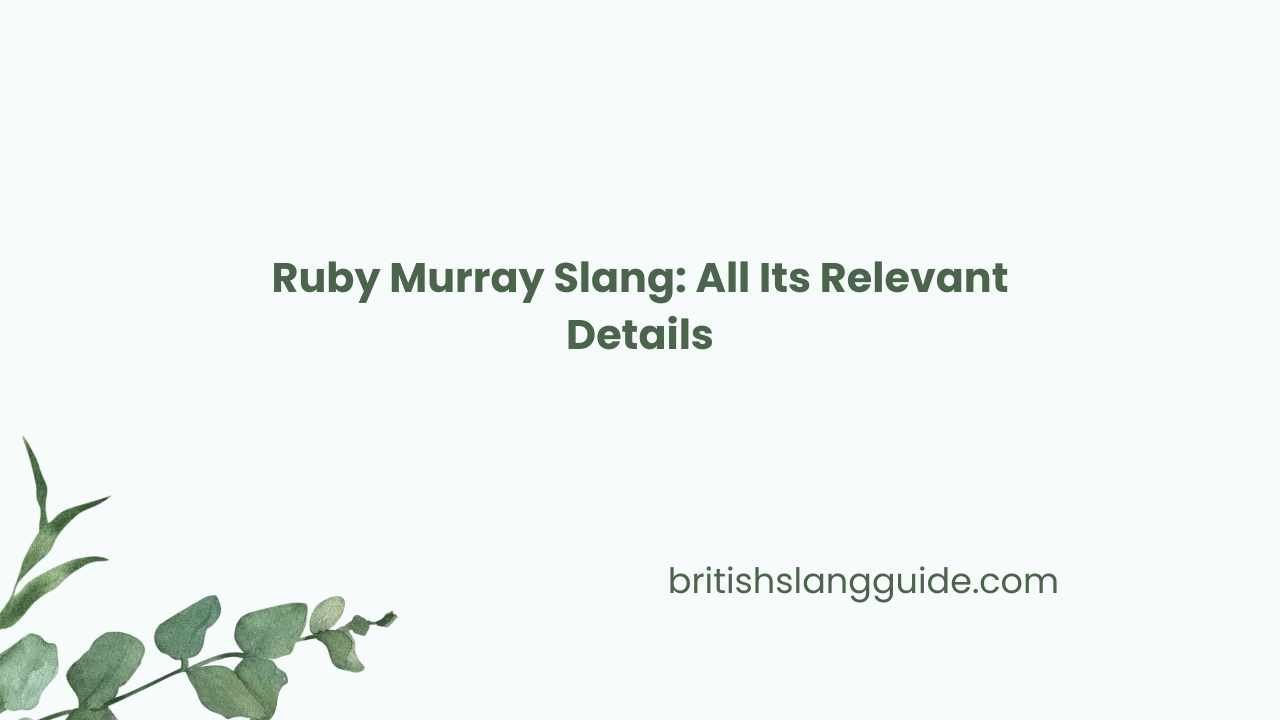| Please Wait Loading ..... |
 |

Languages are not only continuously evolving but they also reflect the cultural background of their creators. Cockney rhyming slang is used as a playful tradition and has become popular over the centuries, especially in the community of the working class of London.
Among these slangs, the most colorful expression is “Ruby Murray”. This slang has no relation to the precious stone. Although this slang refers to this, actually in slang it refers to the very beloved dish which is quite popular in British cuisine named “Curry”.
In this article, we will discuss in detail the meaning of this colorful expression, how it originated, and what is the cultural history and usage of this slang.
The phrases of a Cockney rhyming slang are made by replacing common words with others to make a rhyme with them. In many cases, Rhyming parts are often dropped entirey. This term rhymes with “Ruby Murray” which is why this slang is now used as a short term for this dish.
Understand this with the help of an example like a customer saying that “I want a Ruby tonight which means that he wants a “curry”.
Those who do not know the original meaning of it might think that the person is calling for somebody whose name is “Ruby Murray”. As these slangs are popular in London, those who are familiar with this slang instantly understand that it’s time for an Indian meal.
This emerged in the 1940s and 50s when slang was very well-known in the working class of London. The one thing that is quite special in “Ruby Murray” is that it is not just made up of common words. It is named after a real person who is a popular Irish singer.
“Ruby Murray” was a well-known vocalist in her era. She’s famous for her gentle and sweet singing voice. She got fame so quickly that from 1950 to 1960 five of her songs were in the top 20 in the UK.
Her name was very catchy and easy to remember and it perfectly rhymed with curry so that was the main purpose of making this slang.
This slang became very famous among all slang terms because “Curry” is very popular in British society. After World War II, there was a wide immigration from South Asia to the British scene, and all of these immigrants were from Bangladesh, India, and Pakistan.
Due to their migration, people brought their traditions, their culture, and their cuisines with them which led to rapid day-to-day change in the culture of the UK. Day by day, Curry became a popular and regular dish for many British people.
This slang shows the English language changes that came over time and how different cultures affect it. Even though these rhyming slang are now declining in our daily use, there are such terms that still hold their place and Ruby is one of those that is keeping them alive in the London community.
“Ruby Murray” is a very beloved singer and this language immortalizes her name. It is now engraved in the lives of British people and has become a national identity for the British.
The actual charm of this lies in its informality and the sense of fun created by those who understand it. For example, during a night out with friends someone says that we are starving shall we eat a Ruby? Another example is: After playing this round we all went for a Ruby.
Although these rhyming things are not as famous in East London as it was in the 1900s in the community of the developing class of London, “Ruby Murray” is one of those slang terms that are still recognised. This language still appears in comedy shows, movies, films, and music. It is also used as a name for those restaurants that serve curry as a main dish across the UK.
This slang is more than just a funny linguistic twist. The history and origin of this slang tell the story of British culture. It also shows the legacy of the 1950s singing star. This rhyming slang shows the love of rhyming wordplay and also shows affection for a dish that symbolises the multicultural character of the UK. By just moving words it holds humour, history, and the evolution of the English language.
By using this slang you can add joy and humour to your daily conversations. So know that when somebody calls you for a Ruby, you must not get confused with the stone.
Comments